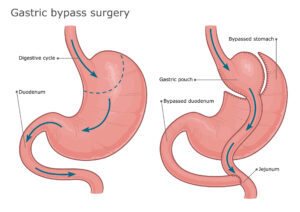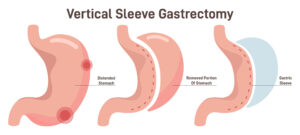Weight loss surgery can be a life-changing intervention for people living with obesity and its related health issues. Two of the most popular procedures are the gastric bypass and gastric sleeve. Whilst both procedures help with weight loss and can improve health, they differ in terms of the approach, recovery, risks, and results.
This blog explores the main differences between the gastric bypass and gastric sleeve procedures to help you make an informed decision.
Before diving into the differences, let’s look at what each procedure entails.
Gastric Bypass (Roux-en-Y Gastric Bypass)
During a gastric bypass procedure, the surgeon creates a small pouch at the top of the stomach. This pouch is then connected directly to the small intestine, bypassing a large portion of the stomach and a segment of the intestine.
This results in a smaller stomach that can hold less food and an altered digestive process that reduces the amount of calories absorbed by the body. There are also changes to the gut flora and hormones produced in the intestine which changes feelings of satiety.

Gastric Sleeve (Sleeve Gastrectomy)
Around 75-80% of the stomach is removed during a gastric sleeve procedure, leaving behind a narrow, tube-like sleeve. This smaller stomach reduces the amount of food you can eat and lowers the production of ghrelin, one of the hormones responsible for hunger.
Unlike a gastric bypass, the digestive process remains unchanged; food still follows the normal path through the stomach and intestines.

Key Differences Between Gastric Bypass and Gastric Sleeve
- Surgical Procedure
Gastric Bypass: Involves two major changes – the creation of a small stomach pouch and the rerouting of the small intestine to this pouch. This effectively limits your food intake and reduces absorption.
Gastric Sleeve: Only involves reducing the size of the stomach, without rerouting or altering the path of the intestines.
Weight Loss Results
Gastric Bypass: Typically results in more rapid weight loss. On average, people lose around 20-30% of their total body weight following a gastric bypass.
Gastric Sleeve: Can still lead to substantial weight loss but this may be more gradual and steadier than with a gastric bypass. Following a gastric sleeve, people usually lose an average of around 20-25% of their total body weight.
Nutritional Considerations
Gastric Bypass: Alters the absorption of nutrients, making deficiencies in vitamins and minerals like iron, calcium, vitamin B12, and folate more likely. Lifelong supplementation is often necessary.
Gastric Sleeve: Since the digestive process remains intact, the risk of nutritional deficiencies is lower compared to gastric bypass. However, supplementation is still recommended. This is because the acid production from the stomach is lowered which aids absorption.
Impact on Hunger and Hormones
Gastric Bypass: Reduces hunger mainly through changes in hormone levels due to the rerouting of the digestive system and the smaller stomach pouch. Food passes very quickly into the small intestine.
Gastric Sleeve: Decreases hunger significantly by reducing the production of ghrelin, the "hunger hormone," because a large portion of the stomach where ghrelin is produced is removed.
Complications and Risks
Gastric Bypass: Has a higher risk of complications such as "dumping syndrome," where food moves too quickly into the small intestine, causing symptoms like nausea, vomiting, diarrhoea, and abdominal pain. There's also a higher chance of intestinal blockage and ulcers.
Gastric Sleeve: Has fewer complications related to digestion since the intestines are not rerouted. However, there is a risk of leakage along the staple line of the stomach and potential acid reflux.
Reversibility
Gastric Bypass: Considered a more permanent procedure, and while it can technically be reversed, the process is complex and involves significant risks.
Gastric Sleeve: This surgery is not reversible, as a large portion of the stomach is permanently removed.
Suitability for Patients
Gastric Bypass: Can be considered for individuals with a body mass index (BMI) of 35 or above. May be more suitable for those needing to lose larger amounts of weight or those with a higher BMI. Gastric bypass may also lead to improvement in certain conditions such as gastroesophageal reflux disease (GERD).
Gastric Sleeve: Suitable for individuals with a similar BMI but may also be recommended for those who have specific conditions, such as inflammatory bowel disease, where rerouting the intestines could cause problems.
Gastric Bypass vs. Gastric Sleeve – Advantages and Disadvantages
| Gastric Bypass | Gastric Sleeve |
| Advantages:
Ø More rapid and significant weight loss Ø Effective for long-term management of obesity-related conditions Ø Can be a better option for individuals with severe acid reflux |
Advantages:
Ø Simpler procedure with fewer risks Ø Lower risk of nutritional deficiencies compared to gastric bypass Ø Reduces hunger significantly |
| Disadvantages:
Ø Higher risk of complications, including nutritional deficiencies Ø More complex surgical procedure Ø Dumping syndrome may occur |
Disadvantages:
Ø Weight loss may be slower compared to gastric bypass Ø Not reversible, as a large portion of the stomach is removed Ø Can worsen or cause new-onset acid reflux |
Which Procedure Is Right for You?
The decision between gastric bypass and gastric sleeve depends on individual health factors, weight loss goals, and personal preferences. It's essential to discuss the options with your chosen provider who can evaluate your medical history, lifestyle, and weight loss needs. Here are some important factors to consider:
Severe Acid Reflux: Gastric bypass may be more suitable, as gastric sleeve could exacerbate symptoms.
Need for Rapid Weight Loss: Gastric bypass generally leads to faster and more significant weight loss.
Concern About Nutrient or medicaton absorption: Gastric sleeve may be preferable due to a lower risk of nutrient deficiencies.
Simplicity and Risks: Gastric sleeve may be favoured because it does not involve rerouting the intestines.
Conclusion
Both gastric bypass and gastric sleeve surgeries offer effective solutions for weight loss and can significantly improve the quality of life for individuals struggling with obesity. However, they come with different approaches, risks, and outcomes. By understanding these differences, you can make an informed decision about which procedure aligns best with your health goals.
Always consult a specialist team like The Bariatric Group to determine the most appropriate surgical option based on your unique health profile. Whether you choose gastric bypass or gastric sleeve, the journey towards a healthier life is a significant step forward.



